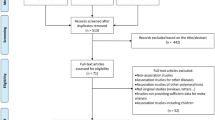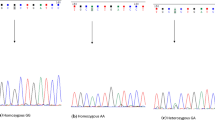Abstract
There are no good genetic markers for incorporating the study of genetic susceptibility to obesity in epidemiological studies. In animal models, the leptin (LEP) and the leptin receptor (LEPR) genes have been shown to be very important in obesity because leptin functions as a negative feedback signal in regulating body-weight through reducing food intake and stimulating energy expenditure. In humans, several polymorphisms in these genes have been described. However, their association with obesity is still very controversial because there are no good case-control studies designed to specifically test this association. Our objective has been to conduct a population-based case-control study to estimate the risk of obesity arising from the −2548G > A and Q223R polymorphisms in the LEP and LEPR genes, respectively. 303 obese cases (101 men and 202 women) and 606 controls (202 men and 404 women) were selected from a Spanish Mediterranean population. Genetic, clinical and life-style characteristics were analyzed. No association was found between the −2548G > A polymorphism and obesity. However, the Q223R variant was significantly associated with obesity in a recessive model, the RR genotype being more prevalent in controls than in obese subjects. The inverse association between the Q223R polymorphism and obesity (OR = 0.62; 95% CI: 0.39–0.99) remained significant even after additional adjustment for education, tobacco smoking, alcohol, physical activity, origin of the obese patient, and the −2548G > A polymorphism in the LEP gene (OR = 0.54; 95% CI: 0.32–0.89). In conclusion, the −2548G > A polymorphism is not a relevant obesity marker in this Mediterranean population, although Q223R does seen to be so.
Similar content being viewed by others
References
Damcott CM, Sack P, Shuldiner AR (2003) The genetics of obesity. Endocrinol Metab Clin North Am 32:761–786
Speakman JR (2004) Obesity: The integrated roles of environment and genetics. J Nutr 134:2090S–2105S
Loos RJ, Bouchard C (2003) Obesity–is it a genetic disorder? J Intern Med 254:401–425
Haslam DW, James WP (2005) Obesity. Lancet 366:1197–1209
Zhang Y, Proenca R, Maffei M, Barone M, Leopold L, Friedman JM (1994) Positional cloning of the mouse obese gene and its human homologue. Nature 372:425–432
Murphy JE, Zhou S, Giese K, Williams LT, Escobedo JA, Dwarki VJ (1997) Long-term correction of obesity and diabetes in genetically obese mice by a single intramuscular injection of recombinant adeno-associated virus encoding mouse leptin. Proc Natl Acad Sci USA 94:13921–13926
Ioffe E, Moon B, Connolly E, Friedman JM (1998) Abnormal regulation of the leptin gene in the pathogenesis of obesity. Proc Natl Acad Sci USA 95:11852–11857
Chua SC Jr, Chung WK, Wu-Peng XS, et al. (1996) Phenotypes of mouse diabetes and rat fatty due to mutations in the OB (leptin) receptor. Science 271:994–996
de Luca C, Kowalski TJ, Zhang Y, et al. (2005) Complete rescue of obesity, diabetes, and infertility in db/db mice by neuron-specific LEPR-B transgenes. J Clin Invest 115:3484–3493
Clement K, Vaisse C, Lahlou N, et al. (1998) A mutation in the human leptin receptor gene causes obesity and pituitary dysfunction. Nature 392:398–401
Wang TN, Huang MC, Chang WT, et al. (2006) G-2548A Polymorphism of the leptin gene is correlated with extreme obesity in Taiwanese aborigines. Obes Res 14:183–187
Skibola CF, Holly EA, Forrest MS, et al. (2004) Body mass index, leptin and leptin receptor polymorphisms, and non-hodgkin lymphoma. Cancer Epidemiol Biomarkers Prev 13:779–786
Salopuro T, Pulkkinen L, Lindstrom J, et al. (2005) Genetic variation in leptin receptor gene is associated with type 2 diabetes and body weight: The Finnish diabetes prevention study. Int J Obes (Lond) 29:1245–1251
Zacharova J, Chiasson JL, Laakso M (2005) Leptin receptor gene variation predicts weight change in subjects with impaired glucose tolerance. Obes Res 13:501–506
Liu YJ, Rocha-Sanchez SM, Liu PY (2004) Tests of linkage and/or association of the LEPR gene polymorphisms with obesity phenotypes in Caucasian nuclear families. Physiol Genomics 17:101–106
Heo M, Leibel RL, Boyer BB (2001) Pooling analysis of genetic data: the association of leptin receptor (LEPR) polymorphisms with variables related to human adiposity. Genetics 159:1163–1178
Heo M, Leibel RL, Fontaine KR, et al. (2002) A meta-analytic investigation of linkage and association of common leptin receptor (LEPR) polymorphisms with body mass index and waist circumference. Int J Obes Relat Metab Disord 26:640–666
Paracchini V, Pedotti P, Taioli E (2005) Genetics of leptin and obesity: a HuGE review. Am J Epidemiol 162:101–114
Mammes O, Betoulle D, Aubert R (1998) Novel polymorphisms in the 5’ region of the LEP gene: association with leptin levels and response to low-calorie diet in human obesity Diabetes 47:487–489
Mammes O, Betoulle D, Aubert R, Herbeth B, Siest G, Fumeron F (2000) Association of the G-2548A polymorphism in the 5’ region of the LEP gene with overweight. Ann Hum Genet 64:391–394
Considine RV, Considine EL, Williams CJ, Hyde TM, Caro JF (1996) The hypothalamic leptin receptor in humans: identification of incidental sequence polymorphisms and absence of the db/db mouse and fa/fa rat mutations. Diabetes 45:992–994
Thompson DB, Ravussin E, Bennett PH, Bogardus C (1997) Structure and sequence variation at the human leptin receptor gene in lean and obese Pima Indians. Hum Mol Genet 6:675–679
Stefan N, Vozarova B, Del Parigi A, et al. (2002) The Gln223Arg polymorphism of the leptin receptor in Pima Indians: influence on energy expenditure, physical activity and lipid metabolism. Int J Obes Relat Metab Disord 26:1629–1632
World Health Organization. Obesity: preventing and managing the global epidemic. Report of a WHO Consultation on Obesity, Geneva, 3–5 June, 1997. Geneve, Switzerland: World Health Organization, 1998 (WHO TRS 984)
Corella D, Qi L, Sorli JV, et al. (2005) Obese subjects carrying the 11482G > A polymorphism at the perilipin locus are resistant to weight loss after dietary energy restriction. J Clin Endocrinol Metab 90:5121–5126
Corella D, Guillen M, Saiz C, et al. (2002) Associations of LPL and APOC3 gene polymorphisms on plasma lipids in a Mediterranean population: interaction with tobacco smoking and the APOE locus. J Lipid Res 43:416–427
Friedewald WT, Levy RI, Fredrickson DS (1972) Estimation of the concentration of low-density lipoprotein cholesterol in plasma without use of preparative ultracentrifuge. Clin Chem 18:499–502
Le Stunff C, Le Bihan C, Schork NJ, Bougneres P (2000). A common promoter variant of the leptin gene is associated with changes in the relationship between serum leptin and fat mass in obese girls. Diabetes 49:2196–2200
Gotoda T, Manning BS, Goldstone AP, et al. (1997) Leptin receptor gene variation and obesity: lack of association in a white British male population. Hum Mol Genet 6:869–876
Li WD, Reed DR, Lee JH, et al. (1999) Sequence variants in the 5’ flanking region of the leptin gene are associated with obesity in women. Ann Hum Genet 63:227–234
Jiang Y, Wilk JB, Borecki I, et al. (2004) Common variants in the 5’ region of the leptin gene are associated with body mass index in men from the National Heart, Lung, and Blood Institute Family Heart Study. Am J Hum Genet 75:220–230
Chua SC, Jr, White DW, Wu-Peng XS, et al. (1996) Phenotype of fatty due to Gln269Pro mutation in the leptin receptor (Lepr). Diabetes 45:1141–1143
White DW, Wang DW, Chua SC, Jr, et al. (1997) Constitutive and impaired signaling of leptin receptors containing the Gln –> Pro extracellular domain fatty. mutation Proc Natl Acad Sci USA 94:10657–10662
Silver K, Walston J, Chung WK, et al. (1997) The Gln223Arg and Lys656Asn polymorphisms in the human leptin receptor do not associate with traits related to obesity. Diabetes 46:1898–1900
Mammes O, Aubert R, Betoulle D, et al. (2001) LEPR gene polymorphisms: associations with overweight, fat mass and response to diet in women. Eur J Clin Invest 31:398–404
Echwald SM, Sorensen TD, Sorensen TI, et al. (1997) Amino acid variants in the human leptin receptor: lack of association to juvenile onset obesity. Biochem Biophys Res Commun 233:248–252
Yiannakouris N, Yannakoulia M, Melistas L, Chan JL, Klimis-Zacas D, Mantzoros CS (2001) The Q223R polymorphism of the leptin receptor gene is significantly associated with obesity and predicts a small percentage of body weight and body composition variability. J Clin Endocrinol Metab 86:4434–4439
Matsuoka N, Ogawa Y, Hosoda K, et al. (1997) Human leptin receptor gene in obese Japanese subjects: evidence against either obesity-causing mutations or association of sequence variants with obesity. Diabetologia 40:1204–1210
Chung WK, Power-Kehoe L, Chua M, et al. (1997) Exonic and intronic sequence variation in the human leptin receptor gene (LEPR). Diabetes 46:1509–1511
Mattevi VS, Zembrzuski VM, Hutz MH (2002) Association analysis of genes involved in the leptin-signaling pathway with obesity in Brazil. Int J Obes Relat Metab Disord 2002 26:1179–1185
Francke S, Clement K, Dina C (1997) Genetic studies of the leptin receptor gene in morbidly obese French Caucasian families. Hum Genet 100:491–496
Chagnon YC, Chung WK, Perusse L, Chagnon M, Leibel RL, Bouchard C (1999) Linkages and associations between the leptin receptor (LEPR) gene and human body composition in the Quebec Family Study. Int J Obes Relat Metab Disord 23:278–286
Quinton ND, Lee AJ, Ross RJ, Eastell R, Blakemore AI (2001) A single nucleotide polymorphism (SNP) in the leptin receptor is associated with BMI, fat mass and leptin levels in postmenopausal Caucasian women. Hum Genet 108:233–236
Wauters M, Mertens I, Chagnon M (2001) Polymorphisms in the leptin receptor gene, body composition and fat distribution in overweight and obese women. Int J Obes Relat Metab Disord 25:714–720
Ukkola O, Tremblay A, Despres JP, Chagnon YC, Campfield LA, Bouchard C (2000) Leptin receptor Gln223Arg variant is associated with a cluster of metabolic abnormalities in response to long-term overfeeding. J Intern Med 248:435–439
Guizar-Mendoza JM, Amador-Licona N, Flores-Martinez SE, et al. (2005) Association analysis of the Gln223Arg polymorphism in the human leptin receptor gene, and traits related to obesity in Mexican adolescents. J Hum Hypertens 19:341–346
Acknowledgements
This work has been supported by grant GV2004B/310 from the Consellería de Empresa, Universidad y Ciencia, Generalitat Valenciana, and grant G03/160 from the Instituto de Salud Carlos III, Spain.
Author information
Authors and Affiliations
Corresponding author
Rights and permissions
About this article
Cite this article
Portolés, O., Sorlí, J.V., Francés, F. et al. Effect of genetic variation in the leptin gene promoter and the leptin receptor gene on obesity risk in a population-based case-control study in Spain. Eur J Epidemiol 21, 605–612 (2006). https://doi.org/10.1007/s10654-006-9045-6
Accepted:
Published:
Issue Date:
DOI: https://doi.org/10.1007/s10654-006-9045-6




